跨文化交流概念整理
跨文化交际概述

国际商务谈判案例
中美贸易谈判
中美两国在贸易谈判中,由于文化背景和价值观的差异,双 方在谈判中出现了不少误解和冲突。然而,通过跨文化交际 的技巧和策略,双方最终达成了共识,实现了互利共赢的目 标。
欧盟与非洲国家的合作协议
欧盟与非洲国家在合作协议的谈判中,由于文化差异和利益 诉求的不同,双方经历了多次的沟通和协商。最终,通过跨 文化交际的努力,双方达成了多项合作协议,促进了双方的 经济和社会发展。
教育领域的跨文化交际案例
孔子学院的国际化推广
孔子学院在全球范围内的推广过程中,注重跨文化交际的应用。通过与当地文化的融合和交流,孔子学院成功地 推广了中国文化,促进了中外文化的交流和理解。
国际教育交流项目
各国高校之间的国际教育交流项目,为学生提供了跨文化交际的机会。通过参与国际教育交流项目,学生可以深 入了解不同国家的文化背景和价值观,提高跨文化交际的能力。
持续沟通
通过持续、开放的沟通,增进双方的理解与合作, 共同实现跨文化交际的成功。
04
跨文化交际的挑战与应对
语言障碍
语言差异
语言表达能力
不同文化背景的人可能使用不同的语 言或方言,导致沟通困难。
有些人可能缺乏流利的外语表达能力, 影响有效沟通。
语言理解
由于语言习惯、表达方式的不同,可 能产生误解或歧义。
跨文化交际概述
• 跨文化交际的定义与重要性 • 跨文化交际的核心概念 • 跨文化交际的技巧与策略 • 跨文化交际的挑战与应对 • 跨文化交际的案例分析
01
跨文化交际的定义与重要性
定义
跨文化交际是指来自不同文化背 景的人们之间的交流和互动。
它涵盖了语言、文化、价值观、 社会规范、信仰和习俗等方面的
什么是跨文化交流?
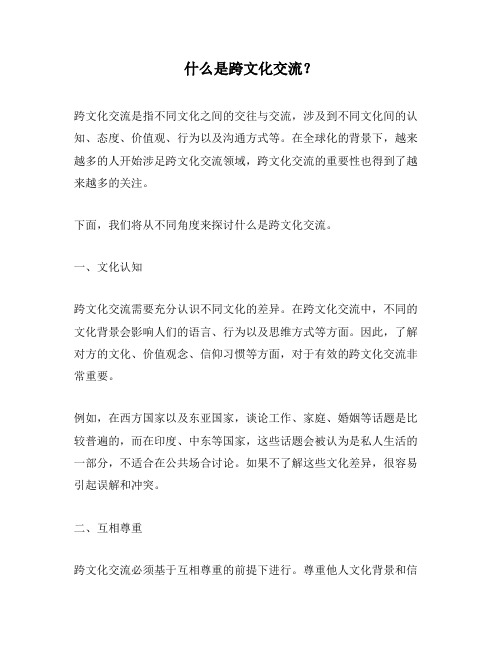
什么是跨文化交流?跨文化交流是指不同文化之间的交往与交流,涉及到不同文化间的认知、态度、价值观、行为以及沟通方式等。
在全球化的背景下,越来越多的人开始涉足跨文化交流领域,跨文化交流的重要性也得到了越来越多的关注。
下面,我们将从不同角度来探讨什么是跨文化交流。
一、文化认知跨文化交流需要充分认识不同文化的差异。
在跨文化交流中,不同的文化背景会影响人们的语言、行为以及思维方式等方面。
因此,了解对方的文化、价值观念、信仰习惯等方面,对于有效的跨文化交流非常重要。
例如,在西方国家以及东亚国家,谈论工作、家庭、婚姻等话题是比较普遍的,而在印度、中东等国家,这些话题会被认为是私人生活的一部分,不适合在公共场合讨论。
如果不了解这些文化差异,很容易引起误解和冲突。
二、互相尊重跨文化交流必须基于互相尊重的前提下进行。
尊重他人文化背景和信仰宗教等方面,是跨文化交流最基本的原则。
只有以平等、互相尊重的态度交流,才能建立起良好的跨文化关系。
例如,穆斯林在节日期间通常不喝酒,如果送礼的人赠送酒类礼物,就可能引起失望和困惑。
如果对方能够了解穆斯林的信仰习惯,送一些非酒类礼物,就不会引起误解和不愉快的情况。
三、有效沟通跨文化交流必须进行有效沟通,才能让双方相互了解和理解。
在跨文化交流中,由于语言、习惯等方面的差异,很容易引起误解和沟通障碍。
因此,如何有效地进行跨文化沟通成为了非常关键的问题。
例如,在跨文化交流中,使用不同的语言是一个普遍的挑战。
为了便于双方的沟通,可以使用双语对话或借助翻译工具进行交流。
此外,在语言表达上要尽量避免使用口头语言或难以理解的术语,以免造成双方的误解和不适。
四、文化融合跨文化交流的本质是促进文化融合。
在不同文化之间的交流中,双方都可以学习、借鉴对方文化中的优秀元素,以丰富自己的视野和认知。
通过文化融合,不同文化间的距离会逐渐缩小,人们能够更加和谐地生活在这个世界上。
例如,中国的中医是一种传统的养生方法,在古代曾被广泛传播到世界各地。
跨文化交际知识点汇总
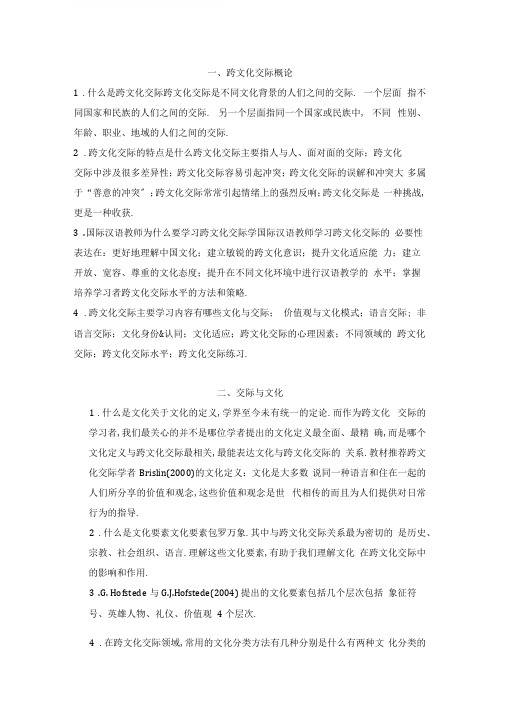
一、跨文化交际概论1.什么是跨文化交际跨文化交际是不同文化背景的人们之间的交际. 一个层面指不同国家和民族的人们之间的交际. 另一个层面指同一个国家或民族中, 不同性别、年龄、职业、地域的人们之间的交际.2.跨文化交际的特点是什么跨文化交际主要指人与人、面对面的交际;跨文化交际中涉及很多差异性;跨文化交际容易引起冲突;跨文化交际的误解和冲突大多属于“善意的冲突〞;跨文化交际常常引起情绪上的强烈反响;跨文化交际是一种挑战,更是一种收获.3.国际汉语教师为什么要学习跨文化交际学国际汉语教师学习跨文化交际的必要性表达在:更好地理解中国文化;建立敏锐的跨文化意识;提升文化适应能力;建立开放、宽容、尊重的文化态度;提升在不同文化环境中进行汉语教学的水平;掌握培养学习者跨文化交际水平的方法和策略.4.跨文化交际主要学习内容有哪些文化与交际;价值观与文化模式;语言交际; 非语言交际;文化身份&认同;文化适应;跨文化交际的心理因素;不同领域的跨文化交际;跨文化交际水平;跨文化交际练习.二、交际与文化1.什么是文化关于文化的定义,学界至今未有统一的定论.而作为跨文化交际的学习者,我们最关心的并不是哪位学者提出的文化定义最全面、最精确,而是哪个文化定义与跨文化交际最相关,最能表达文化与跨文化交际的关系.教材推荐跨文化交际学者Brislin(2000)的文化定义:文化是大多数说同一种语言和住在一起的人们所分享的价值和观念,这些价值和观念是世代相传的而且为人们提供对日常行为的指导.2.什么是文化要素文化要素包罗万象.其中与跨文化交际关系最为密切的是历史、宗教、社会组织、语言.理解这些文化要素,有助于我们理解文化在跨文化交际中的影响和作用.3.G. Hofstede与G.J.Hofstede(2004) 提出的文化要素包括几个层次包括象征符号、英雄人物、礼仪、价值观4个层次.4.在跨文化交际领域,常用的文化分类方法有几种分别是什么有两种文化分类的方法在跨文化交际领域最为常用.一种是客观文化与主观文化.另二种是主导文化与亚文化.5.文化有什么特点呢〔1〕文化是后天习得的.〔2〕文化是共享的,并世代相传.〔3〕大局部文化是无意识的.〔4〕文化是象征的.〔5〕文化是动态的.6.什么是交际与文化的定义相似,关于交际的定义也非常丰富和复杂.教材仅推荐与跨文化交际语用领域相关的定义.即Gudykunst& Kim〔2003〕提出的关于交际的定义:交际是编码和解码的过程,但是这种编码和解码的过程并非单纯的传递和接受过程,而是包含着意义的协商和共建.7.交际的要素是什么交际是互相交往的过程,交际的全部过程包含以下要素:传送者、信息、编码、解码、媒介、反响、噪音.8.交际有什么特点〔1〕交际是象征的〔2〕交际是动态的过程〔3〕交际涉及意义的协商和共建〔4〕交际发生在意识的各个层面.〔5〕交际是特定语境中发生的.9.文化对交际有什么影响文化从两个层面影响交际:一是从文化标准的层面,二是从个人层面.文化影响着人们的感知.首先, 文化影响人们对外部刺激的选择.其次,文化影响人们对外部刺激的分类.第三,文化影响人们对外部刺激的意义联想.最后,文化影响人们对外部刺激的解释.文化的特征值是它为行为提供指南.文化影响人们的饮食行为.文化还影响人们的衣着打扮.文化影响居住方式.文化影响人们的出行方式.文化也影响了人与人交往的方式.1.什么是价值观价值观不是实际的行为, 而是关于行为的规那么;价值观是一套关于什么是真善美的标准系统;这些规那么和标准是用来判断和指导人们的行为的;价值观不是个人的爱好或倾向,而是一种集体的文化意识.2.价值观如何分类一类是终极性价值观, 它是关于生命、生存等终极目标的价值观,另一类是工具性价值观,它是关于道德和水平的价值观.3.价值观有什么特点〔1〕价值观属于深层文化.〔2〕价值观是人们的行为指南. 〔3〕价值观既是稳定的,也是变化的.〔4〕不同文化的价值观既有相同的也有不同的成分.〔5〕价值观被违背时会引起情感上的强烈反响.4.关于价值观模式的研究具有影响力的理论是哪些1.价值取向理论〔由kluckhohn与Strodtbeck提出〕2.文化尺度〔由Hofstede提出〕3.高语境文化与低语境文化〔由Hall提出〕.5.中国文化模式有什么特点〔 1〕集体主义〔2〕以家庭为中央〔3〕尊重传统〔4〕等级观念〔5〕面子观念〔6〕重视人情6.美国文化模式有什么特点〔 1〕个体主义〔2〕平等观念〔3〕强调变化和进步〔4〕物质享受〔5〕科学与技术〔6〕工作与娱乐〔7〕竞争意识四、跨文化的语言交际1概念提要:1.萨丕尔-沃尔夫假说的含义萨丕尔-沃尔有三层含义.〔1〕不同的语言以不同的方式感知和划分世界.〔2〕一个人所使用的语言结构影响他感知和理解世界的方式.〔3〕讲不同语言的人感知世界是不同的.2.语言与价值观之间是什么关系语言与文化的关系最直接的表达是语言表达了人们对世界的看法、态度和价值取向.每种语言都拥有丰富的格言、警句和俗语.这些句子往往就是价值观的表达.3.词义与文化是什么关系在语言的各要素中,词汇与文化的关系最为密切,其对跨文化交际的影响也最为突出.语言的含义不具有普遍性,它受到文化和语境的制约.不同语言和文化的人们进行跨文化交际时,可能会由于对词语含义的误解而产生交流的障碍.4.什么叫委婉语学习它有什么意义禁忌是人类社会普遍存在的文化现象, 人们对诸如生老病死、隐私等许多方面多有避讳,因此产生了大量的委婉语. 了解不同文化中的禁忌和相应的委婉语不仅可以深入理解不同文化的价值取向,也可以防止在跨文化交际中出现不必要的误会.四、跨文化的语言交际2概念提要:1.礼貌原那么包括哪些准那么〔1〕得体准那么〔2〕慷慨准那么〔3〕赞扬准那么〔4〕谦虚准那么〔5〕一致准那么〔6〕同情准那么.2.中国人的礼貌特征包括哪些〔1〕贬己尊人〔2〕称呼准那么〔3〕文雅准那么〔4〕求同准那么〔5〕德、言、行准那么.3.礼貌策略的使用受到什么因素的制约〔1〕说话人与听话人之间的权力距离〔2〕说话人与听话人之间的社会距离〔3〕言语行为的强加程度4.什么是交际风格交际风格是指说话的特点.5.在跨文化交际领域中,常见的交际风格包括哪些〔1〕直接与间接的交际风格〔2〕谦虚与自信的交际风格〔3〕归纳与演绎的交际风格五、跨文化的非语言交际概念提要:1.什么是非言语交际非言语交际不包括语言,而是包括了各种非语言的交际行为;非语言交际具有互动性,涉及信息的发出者和接受者的编码和解码过程;非言语交际是在特定情境中产生的,与语境有密切关系;非语言交际可能是有意的,也可能是无意的.2.非语言交际的功能有哪些〔 1〕传达真实的内在感情〔2〕营造交际印象〔3〕进行会话治理3.非语言交际与语言交际是什么关系非语言交际对语言信息起着重复、补充、代替、标准和否认等作用.4.体态语包括哪些人们的外貌服饰、面部表情、眼神交流、手势、姿势以及身体接触都是体态语,都参与了交际,是非语言交际的一局部.5.时间观念与文化之间有什么联系时间观念是非语言交际的重要维度, 也是价值观的表达.6.什么是单时制文化其特点是什么单时制文化中的时间是线性的,可以向前延伸到未来,向后延伸到过去.单时制文化的人们通过方案和预约来限制时间,在一段时间内只做一件事,强调准时、预约和最后期限.7.什么是多时制文化其特点是什么多时制文化并不把时间看做是线性的.多时制文化中的人认为时间围绕着生活,在同一时间内可以做多件事情.工作常常被打断,方案也常改变.身处多时制文化中的人,维系人际关系和谐远比遵守时间重要.8.人们对于空间的利用与文化之间有什么联系空间利用也是非语言交际的重要内容.空间利用方式表达了特定文化中人际关系的特点.六、文化适应概念提要:1.文化适应策略有哪些同化、别离、融合以及边缘化.2.文化适应是一个复杂、动态的开展过程.短期旅居者的跨文化适应过程分为哪几个阶段蜜月期、挫折期、恢复期和适应期.3.焦虑处理理论认为什么因素影响跨文化适应个体性格因素、社会支持、性别、民族、处理文化适问题的策略等.4.什么是文化休克文化休克是一种因失去了熟悉的社会交往符号而产生的心理焦虑.5.应对文化休克可采取什么策略应对呢广交朋友,建立良好人际关系;学习目的国的语言;了解目的文化的知识;做自己感兴趣的事情;参加社会文化活动;改变自己的思维.6.什么是文化适应假说第二语言教学领域的学者很早注意到了文化适应与第二语言学习的关系.Schuman(1986跟出了文化适应假说〞.他认为, 学习者只有适应了第二文化以后才能习得第二语言,文化适应的程度决定第二语言学习的程度.7.Schuman(198觎出的社会距离的概念是什么社会距离指的是学习者的原有文化与目的语文化之间的差异程度.七、跨文化的人际交往概念提要:1.人际关系与文化的联系表达在哪几方面不同文化间的朋友关系、人情关系、工作关系、与陌生人之间的关系都受到文化的影响.2.交往习俗与文化之间有什么联系在社会交往中,人们需要遵循社交礼仪和规那么,而这些规那么会因文化而异.一种文化中得体、礼貌的规那么到了另一种文化中可能是不得体的,甚至还造成了冒犯.了解不同文化的社交习俗和礼仪,对提升跨文化交际的有效性和得体性是非常有必要的.3.公共礼仪与文化之间有什么联系遵守公共秩序和礼仪是现代人的基本素养,也是一个国家文明程度的表达. 在跨文化交往中,了解和遵守不同文化的公共礼仪非常重要.不遵守公共礼仪会给人留下负面的印象,甚至引起跨文化交往中的冲突.八、跨文化人际交际的心理与态度概念提要:1.什么是刻板印象刻板印象又作成见〞与谊型观念〞,是指一个群体成员特征的概括性看法.2.刻板印象有什么特点〔1〕刻板印象是人们正常思维的一局部.〔2〕刻板印象是文化的一局部.〔3〕刻板印象的最大局限是以偏概全,无视个体差异.3.如何克服刻板印象〔1〕意识到刻板印象的存在.〔2〕改变懒惰和简化的思维习惯.〔3〕扩大与不同文化的人的接触范围.〔4〕试图寻找充分的证据和例外的情况.〔5〕对于来自其他文化的个人的行为的描述,应采用表达性语言,而不是对这一文化群体进行评价和简单概括.4.什么是偏见偏见是对一个群体的成员建立在错误而僵化的概括根底上的负面感情5.如何克服偏见〔1〕坦诚面对自己的偏见.〔2〕扩大与不同文化的人的接触范围.〔3〕参加课程学习和培训.〔4〕在交际中防止使用带有偏见或歧视色彩的表达方式,特别是对弱势群体要注意使用委婉而礼貌的称呼.6.什么是种族中央种族中央指的是在思考和评价别的文化时,把自己的文化放在一切事物的中央位置,并且以自己文化的框架作为衡量的标准.7.什么是文化相对主义文化相对主义是与种族中央主义相对的概念.它最早由美国著名人类学家弗朗兹博厄斯所倡导.其包括两个方面的内容.第一, 每种文化都有自己长期形成的独特历史, 其形态并无上下之分;第二,任何一个民族都有自己的社会思想、世界观和道德观,人们不应该用自己的一套标准来衡量其它民族的文化.。
对跨文化交流的理解

对跨文化交流的理解跨文化交流是指不同文化之间的信息交流、理解和交融的过程。
当不同文化的人群相互接触和交往时,由于语言、信仰、价值观等方面的差异,往往会出现沟通困难、误解和冲突。
跨文化交流的目标是建立和谐、互敬互信的关系,促进文化间的相互了解和尊重,达到互利共赢的效果。
然而,由于文化的复杂性和多样性,跨文化交流面临着各种挑战和难题。
首先,语言不通是最常见的问题。
不同国家和地区使用的语言存在差异,即便使用的是共同的语言,语言的用法和文化背景也会导致交流的困难。
其次,价值观和生活习惯的不同也会影响交流。
人们对于友谊、家庭、工作、时间等方面有着不同的看法和做法,这种差异容易引发误解和冲突。
再次,文化的身份认同和自豪感也是跨文化交流中的敏感问题。
文化的差异常常导致文化优越感和歧视,从而影响了人们的交流和理解。
最后,文化背后隐藏着的历史、地理、宗教及传统也会影响到交流的进行。
了解这些文化上的差异可以帮助我们更好地理解他人的行为和想法。
为了有效地进行跨文化交流,以下是一些建议。
首先,学习对方的语言是非常重要的。
精通对方的语言可以极大地促进交流和理解。
其次,提高文化敏感性,意思是尊重和欣赏不同文化背景的人和事物。
尊重和欣赏的态度可以化解误解和冲突,营造和谐的氛围。
另外,开放的心态也是至关重要的。
要愿意接受和了解不同的观点和经验,而不仅仅是坚持己见。
最后,建立跨文化交流的平台和机制也是必要的。
国际组织、交流学校、跨国公司等提供了各种交流和互动的机会,促进不同文化之间的交流和合作。
总之,跨文化交流是全球化进程中不可或缺的一部分。
通过跨文化交流,我们可以拓宽自己的视野,尊重和欣赏他人的文化背景,并促进不同文化间的相互理解和合作。
虽然跨文化交流面临着各种挑战和困难,但通过适当的方法和态度,我们可以克服这些问题,实现和谐共存、互利共赢的目标。
跨文化交际概念

跨文化交际概念“跨文化交际”的英语名称是“cross-cultural communication(或inter-cultural communication)”。
它指本族语者与非本族语者之间的交际,也指任何在语言和文化背景方面有差异的人们之间的交际。
通俗来说就是如果你和外国人打交道(由于存在语言和文化背景的差异),应该注意什么问题,应该如何得体地去交流。
从对外汉语专业的角度,“跨文化交际”的概念可以这样界定:在特定的交际情景中,具有不同的文化背景的交际者使用同一种语言(母语或目的语)进行的口语交际。
它包含以下几个要点:1.交际双方必须来自不同的文化背景文化背景的差异是一个宽泛的概念,既是指不同文化圈之间的差异,也是指同一文化圈内部亚文化之间的差异。
不过立足对外汉语专业,文化差异主要指不同文化圈之间的差异,尤其是中国和欧美国家的文化差异。
因为从跨文化交际的实际情形来看,由于文化背景的差异导致交际失误,容易引起冲突的主要是中国和欧美国家的人际交往。
中国同亚洲地区国家,如日本、韩国以及东南亚一些国家的人际交往,虽然也有文化差异的一面,但要顺利的多,这是因为这些国家与中国同属东方文化圈,彼此之间在文化取向和交际规范方面有很多相通的地方。
[1]2.交际双方必须使用同一种语言交际这是显而易见的,假如一方使用一种语言,而另一方使用另外一种不同的语言,交际是无法进行的。
但是,既然交际的双方来自不同的文化背景,又要使用同一种语言,那么用来交际的语言对一方来说是母语,而对另一方来说必然是第二语言(习得的“目的语”)。
比如一个中国人与一个美国人交谈,他们可以选择使用汉语,也可以选择使用英语,这样他们就可以用同一种语言直接交际,而不需要通过翻译这个中间环节。
这样界定的着眼点也是由对外汉语专业的特点决定的。
3.交际双方进行的是实时的口语交际跨文化交际的途径多种多样。
可以是语言符号的交际,也可以是非语言符号的交际,如商品、画报、实物、影像、演出到其他物化形式符号的交际;可以是现场的双向交际,也可以是通过媒介的单向交际,如电视、广播、报刊、广告等传播方式的交际;可以是口语交际,也可以是书面交际,如信函、公文等的来往。
跨文化交流概念整理

CatalogueChapter 1 (2)Chapter 2 (5)Chapter 3 (6)Chapter 4 (8)Chapter 5 (9)Chapter 6 (11)Chapter 7 (12)Chapter 8 (15)Chapter 9 (16)Chapter 11.Culture :➢Anthropological(人类学):It consists of patterns, explicit(含蓄的)and implicit(明晰的), of and for behavior acquired and transmitted(传承的)by symbols, constituting(组成)the distinctive achievement of human groups, including their embodiments in artifacts(工艺品); the essential core(核心)of culture consists of traditional ideas and especially their attached(关联的)values.”➢Psychological(心理学):Culture is the collective programming of the mind whichdistinguishes the members of one category of people from another.➢Sociological(社会学):Culture is defined as a pattern of learned, group-related perception —including both verbal and nonverbal language attitudes, values, belief system, disbeliefsystems, and behavior.Culture pervades(遍及) all these areas:arts and artifacts, beliefs, behaviors, ceremonies, concept of self, customs, ideas and thought patterns, ideals, knowledge, laws, language,manners, morals, myths and legends, religion, rituals(仪式), social institutions(社会机构), tools, and values. Culture is the total sum of human society and its meanings.➢Intercultural(知性):Culture is a system of shared beliefs, values, customs, behaviors and artifacts that are transmitted from generation to generation through learning.➢Summary:We define culture as “the deposit of knowledge, experience, beliefs, values, actions, attitudes, hierarchies, religions, notions of time, roles, spatial relations, concepts of the universe, and artifacts acquired by a group of people in the course of generations throughindividual and group striving.2.Visible Culture: According to The Concise Oxford Dictionary, culture is “the arts and other manifestations of human intellectual achievement regarded collectively”.3.Invisible Culture:4.The nature of Culture(文化属性):a)C ulture is like an iceberg.(参见9,10)b)C ulture is our software.c)C ulture is like the water a fish swims in:The fish takes the water for granted because itis totally surrounded by the water that it really cannot imagine another environment. Thesame is true for us. Our culture is so much a part of who we are and what the world is like for us that we do not notice it. We take it for granted.d)C ulture is the grammar of our behavior: In order to behave appropriately(合适地) in anysociety, people need to know the culture. It includes all the rules that make actionsmeaningful to the people around them.5.Characteristic of Culture :a)C ulture is learned(习得的):We learn our culture: ①through proverbs(谚语)②from folklore(民间故事)③through art④mass media(大众传媒).b)C ulture is dynamic(动态的):Four major aspects account for the change of cultures: ①technological invention②disaster: include natural and human calamities(灾难)③culturecontact(文化接触)④environment factors(环境因素).c)C ulture is pervasive(普遍的):Like the air we breathe, culture penetrates(渗透) into everyaspect of our life and influences the way we think, the way we talk, and the way we behave.d)C ulture is integrated(综合的):Culture functions as(起到作用) an integrated whole and it issystemic. You touch a culture in one place and everything else is affected.e)C ulture is adaptive(具有适应性的):History abounds(富于) with examples of how cultureshave changed because of laws, natural disasters, wars, or other calamities.6.Cultural Identity(文化身份):Cultural identity refers to one’s sense of belonging to a particular culture or ethnic(种族的;民族的) group.7.Formation of Cultural Identitya)Unexamined Cultural Identity (文化身份不确定阶段):take for granted;little interest;lack anawareness of.b)Cultural Identity Search(找寻文化身份阶段):c)Cultural Identity Achievement(习得文化身份阶段):8.Subculture(亚文化):➢It refers to a culture that exists within dominant culture(主流文化), and is often based on economic or social class, ethnicity, race, or geographic region.➢Subcultures refer to different social communities that share race, or ethnic background, or profession, or gender, or age, or sexual preference.➢A subculture resembles(类似,像) a culture in that it usually encompasses(包含) a relatively large number of people and represents(代表) the accumulation(积累) of generations ofhuman striving. However, subcultures have some important differences: they exist withindominant cultures(主流文化) and are often based on economic or social class, ethnicity, race, or geographic region.9.Co-culture(共文化): No one culture is superior to other co-exiting cultures. It refers to groups or social communities exhibiting communication characteristics, perceptions, values, beliefs, and practices that are significantly different enough to distinguish them from the other groups, communities, and the dominant culture.10.Subgroup(亚群体):It does not involve the same large number of people and is not necessarily thought of as accumulating values and patterns of behavior over generations in the same way as cultures do. Subgroups can be as small as a few people or as large as a major religion.11.Characteristics of Subgroups:a)“Deviant” label: It simply means differing from the cultural norm, such as vegetarians in ameat-eating society.b)T emporality: Members may participate for a time and later become inactive or separate from italtogether.c)“Wanna-be” behavior:An individual who imitates the behavior of a group he or she desires tobelong to.Chapter 2ponents of Communication(交际要素):a)Sender/Source (信息源): It is the person who transmits a message.b)Message: It is any signal that triggers(引发,引起) the response of a receiver.c)Encoding(编码): Encoding refers to the activity during which the sender must choosecertain words or nonverbal methods to send an intentional(故意的,计划的) message.d)Channel /Medium: It is the method used to deliver a message.e)Receiver: It is any person who notices and gives some meaning to a message.f)Decoding(解码): It is the activity during which the receiver attaches meaning to thewords or symbols he/she has received.g)Feedback (反馈): The response of a receiver to a sender’s message.h)Noise:is anything that distorts(interfere干扰)the message, including externalnoise(外界干扰),physiological noise(生理干扰) ,psychological noise(心理干扰) andsemantic noise(语义干扰). Noise is inevitable(必然的,不可避免的).i)Context(语境): The setting or situation within which communication takes place.2.Intercultural communication(跨文化交际): It is the communication between people ofdifferent cultural backgrounds whose cultural perceptions and symbol systems are distinctenough to alter the communication events.3.Intracultural communication(文化内交际): It is defined as communication between oramong members of the same culture.4.Interpersonal communication(人际交流): It is form of communication that involves a smallnumber of individuals who are interacting(交流) exclusively(专有地)with one another andwho therefore have the ability to adapt their messages specifically for those others and to obtain immediate interpretations(解释) from them .5.International communication(国际交流): it takes place between nations and governmentsrather than individuals; it is quite formal and ritualized(仪式化的).6.Interracial communication(跨种族交际): It occurs when the sender and the receiverexchanging messages are from different races.7.Interethnic communication(跨民族交际): It refers to communication between people of thesame race but different ethnic backgrounds.8.Interregional communication(跨地域交际): This term refers to the exchange of messagesbetween members of the dominant culture within a country.These are members of a culture who share common messages and experiences over a long period of time. However, they live in different regions of the same country.Chapter 31.Sensation(感觉):It is the neurological(神经学上的) process by which people become aware oftheir environment.2.Perceiving:a)Perception(知觉):I t is the process by which we become aware of objects, events, andespecially people and their behavior through our various senses and involves higher-order cognition(认知) in the interpretation(解释) of the sensory information.(知觉是一种人们通过各种感觉来觉察事物、事件、人和人的行为的过程。
跨文化交际 知识点整理
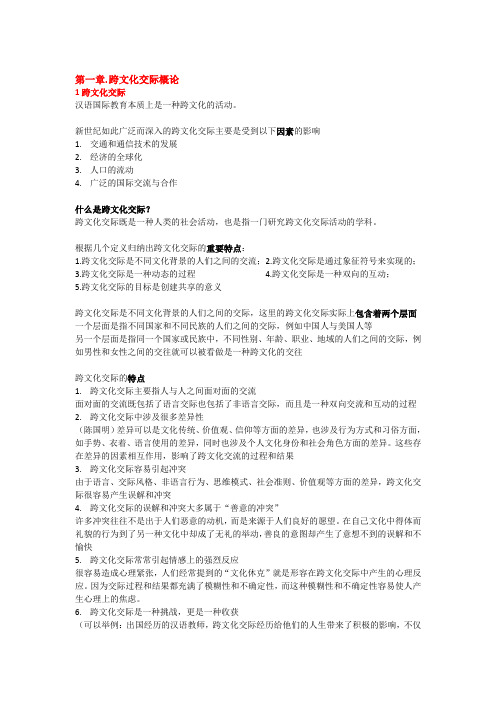
第一章.跨文化交际概论1跨文化交际汉语国际教育本质上是一种跨文化的活动。
新世纪如此广泛而深入的跨文化交际主要是受到以下因素的影响1.交通和通信技术的发展2.经济的全球化3.人口的流动4.广泛的国际交流与合作什么是跨文化交际?跨文化交际既是一种人类的社会活动,也是指一门研究跨文化交际活动的学科。
根据几个定义归纳出跨文化交际的重要特点:1.跨文化交际是不同文化背景的人们之间的交流;2.跨文化交际是通过象征符号来实现的;3.跨文化交际是一种动态的过程4.跨文化交际是一种双向的互动;5.跨文化交际的目标是创建共享的意义跨文化交际是不同文化背景的人们之间的交际,这里的跨文化交际实际上包含着两个层面一个层面是指不同国家和不同民族的人们之间的交际,例如中国人与美国人等另一个层面是指同一个国家或民族中,不同性别、年龄、职业、地域的人们之间的交际,例如男性和女性之间的交往就可以被看做是一种跨文化的交往跨文化交际的特点1.跨文化交际主要指人与人之间面对面的交流面对面的交流既包括了语言交际也包括了非语言交际,而且是一种双向交流和互动的过程2.跨文化交际中涉及很多差异性(陈国明)差异可以是文化传统、价值观、信仰等方面的差异,也涉及行为方式和习俗方面,如手势、衣着、语言使用的差异,同时也涉及个人文化身份和社会角色方面的差异。
这些存在差异的因素相互作用,影响了跨文化交流的过程和结果3.跨文化交际容易引起冲突由于语言、交际风格、非语言行为、思维模式、社会准则、价值观等方面的差异,跨文化交际很容易产生误解和冲突4.跨文化交际的误解和冲突大多属于“善意的冲突”许多冲突往往不是出于人们恶意的动机,而是来源于人们良好的愿望。
在自己文化中得体而礼貌的行为到了另一种文化中却成了无礼的举动,善良的意图却产生了意想不到的误解和不愉快5.跨文化交际常常引起情感上的强烈反应很容易造成心理紧张,人们经常提到的“文化休克”就是形容在跨文化交际中产生的心理反应。
跨文化交际名词解释

跨文化交际名词解释跨文化交际指的是在不同文化背景下进行的交流和互动。
在全球化的背景下,跨文化交际变得越来越重要,因为不同国家和文化之间的交流和合作已经成为现实。
以下是几个与跨文化交际相关的重要名词解释。
1. 文化冲突(Cultural Conflict):指在不同文化间发生的摩擦或冲突。
文化冲突可能源于不同的价值观、信仰、惯例、行为方式等。
通过跨文化交际,人们可以更好地理解和尊重他人的文化差异,减少文化冲突的发生。
2. 文化智商(Cultural Intelligence):指人们在跨文化环境中有效运用跨文化知识、技巧和能力的能力。
高文化智商的个体能够适应和应对不同文化之间的差异,从而更好地与其他人进行有效的跨文化交际。
3. 冷冻音(Frozen Accent):指在学习第二语言时,母语的语音习惯会影响人们发音的现象。
冷冻音是一种跨文化交际的障碍,会导致人们的发音不准确,难以被他人理解。
4. 文化微观描绘(Culture Micro-Mapping):研究人们在跨文化交际中特定情境下的行为和交际方式的方法。
文化微观描绘通过分析人们的行为习惯、价值观念、非语言交际等方面的差异,帮助人们更好地理解不同文化之间的交际模式。
5. 柔性文化 (Flexible Culture):柔性文化强调对不同文化之间的差异保持开放和灵活的态度。
在跨文化交际中,柔性文化的人们能够适应和接纳不同文化的观念和行为方式,与他人进行有效沟通和合作。
6. 文化同化(Cultural Assimilation):指在跨文化交际中,个体为了更好地适应和融入特定文化,逐渐接受并遵从目标文化的价值观、行为方式和社会规范的过程。
文化同化是跨文化交际中一个重要的适应策略。
7. 语言障碍(Language Barrier):指由于语言差异导致的交际障碍。
不同的语言系统和语言表达方式可能使人们难以理解和沟通。
在跨文化交际中,克服语言障碍是一个重要的挑战,可以通过学习对方语言和使用辅助工具等方式解决。
跨文化交际
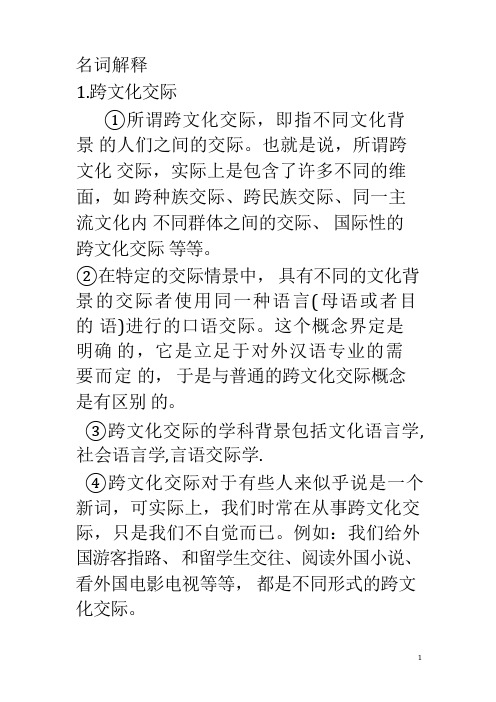
名词解释1.跨文化交际①所谓跨文化交际,即指不同文化背景的人们之间的交际。
也就是说,所谓跨文化交际,实际上是包含了许多不同的维面,如跨种族交际、跨民族交际、同一主流文化内不同群体之间的交际、国际性的跨文化交际等等。
②在特定的交际情景中,具有不同的文化背景的交际者使用同一种语言(母语或者目的语)进行的口语交际。
这个概念界定是明确的,它是立足于对外汉语专业的需要而定的,于是与普通的跨文化交际概念是有区别的。
③跨文化交际的学科背景包括文化语言学, 社会语言学,言语交际学.④跨文化交际对于有些人来似乎说是一个新词,可实际上,我们时常在从事跨文化交际,只是我们不自觉而已。
例如:我们给外国游客指路、和留学生交往、阅读外国小说、看外国电影电视等等,都是不同形式的跨文化交际。
2.文化定势世界上大多数社会中都可能存在着若干群体或者社团,这些群体或者社团对地域、历史、生活方式以及价值观等方面的共享,使其成员形成、发展并强化了自己独特的文化及与之相适应的交际文化。
在跨文化交际研究中,学者们往往倾向于把某一文化群体的每一个成员都视为该文化定势的代表或者整体文化形象。
这种整体式的文化取向通常被称为文化定势。
3.价值观①在跨文化交际研究中,价值观是个至关重要的问题。
价值观是文化的底层,不理解其差异就不能理解不同文化之间的根本差异。
②价值观对人类的活动起着规定性或者指令性的作用,是人们行为的规则、思维的方式、认知的准绳、处世的哲学、推理的模式、评价的依据、道德的标准。
人们在不知不觉中通过交际习得这套价值系统,它变成为了他们的集体无意识,变成为了他们的信仰、心态、行为、生活等诸方面的可评价系统,变成为了他们民族性格的基石。
每一种文化都有其独特的一套系统,而价值观是它的核心。
③价值观总是相对稳定的,一个人的价值观是从出生开始,在家庭和社会的影响下逐步形成的。
一个人所处的社会生产方式及其所处的经济地位,对其价值观的形成有决定性的影响;同时舆论宣传,以及父母、老师、朋友和公众名人的观点与行为,对一个人的价值观形成也有不可忽视的作用4.体态语体态语( body language )是非语言交际的重要组成部份,它包括眼神、手势、身势、面部表情、体距、体触等。
跨文化交流概论
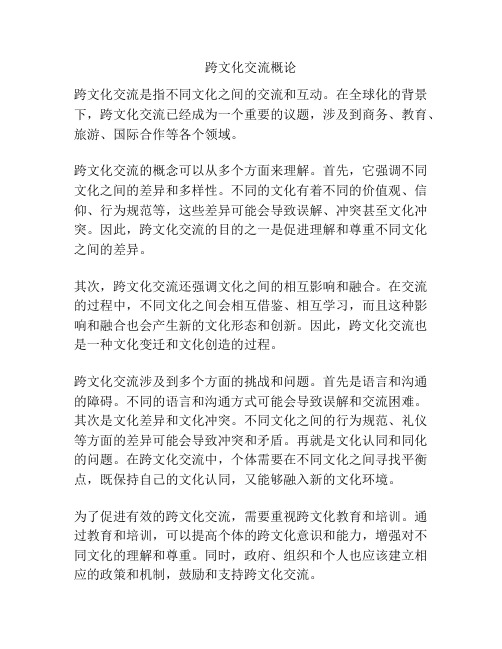
跨文化交流概论
跨文化交流是指不同文化之间的交流和互动。
在全球化的背景下,跨文化交流已经成为一个重要的议题,涉及到商务、教育、旅游、国际合作等各个领域。
跨文化交流的概念可以从多个方面来理解。
首先,它强调不同文化之间的差异和多样性。
不同的文化有着不同的价值观、信仰、行为规范等,这些差异可能会导致误解、冲突甚至文化冲突。
因此,跨文化交流的目的之一是促进理解和尊重不同文化之间的差异。
其次,跨文化交流还强调文化之间的相互影响和融合。
在交流的过程中,不同文化之间会相互借鉴、相互学习,而且这种影响和融合也会产生新的文化形态和创新。
因此,跨文化交流也是一种文化变迁和文化创造的过程。
跨文化交流涉及到多个方面的挑战和问题。
首先是语言和沟通的障碍。
不同的语言和沟通方式可能会导致误解和交流困难。
其次是文化差异和文化冲突。
不同文化之间的行为规范、礼仪等方面的差异可能会导致冲突和矛盾。
再就是文化认同和同化的问题。
在跨文化交流中,个体需要在不同文化之间寻找平衡点,既保持自己的文化认同,又能够融入新的文化环境。
为了促进有效的跨文化交流,需要重视跨文化教育和培训。
通过教育和培训,可以提高个体的跨文化意识和能力,增强对不同文化的理解和尊重。
同时,政府、组织和个人也应该建立相应的政策和机制,鼓励和支持跨文化交流。
总之,跨文化交流是一个涉及到差异、相互影响和融合的过程。
它既是一个挑战,也是一个机遇,可以促进世界各地不同文化之间的理解、合作和发展。
跨文化交流

跨文化交流跨文化交流是当今全球化时代的重要议题。
随着世界经济、社会、文化的快速发展,不同国家与地区之间的交流日益频繁,跨文化交流的重要性也变得愈发突出。
在这个多元化的社会背景下,人们需要具备良好的跨文化交流能力,才能更好地融入全球化的潮流中。
跨文化交流的定义跨文化交流是指来自不同文化、语言、习俗和背景的个体之间进行的交流和互动。
在跨文化交流中,人们需要超越自身的文化观念和语言障碍,尊重并理解对方的文化差异,借此促进不同文化之间的沟通和交流。
跨文化交流的重要性跨文化交流的重要性在于它能够促进文化的多元发展和交流互动。
通过跨文化交流,人们可以学习和了解不同文化的魅力和特点,拓展自己的视野,增进与他人的理解和沟通。
跨文化交流还可以促进国际间的友好关系和合作,推动世界各国之间的文化共融和发展。
跨文化交流的挑战然而,跨文化交流也面临着一些挑战和障碍。
首先是语言障碍,不同国家和地区之间的语言差异会导致沟通不畅,造成不必要的误解和冲突。
其次是文化差异,不同文化背景下的人们在价值观念、习俗礼仪等方面存在差异,容易引发误解和摩擦。
在这种情况下,人们需要具备一定的跨文化交流能力,才能有效地应对这些挑战。
如何提升跨文化交流能力要提升跨文化交流能力,首先需要尊重和理解不同文化的差异。
在与他人交流时,要保持开放的心态,尊重对方的文化背景和观念,避免过于主观地评判和批判。
其次是学习他人的语言和习俗,通过学习对方的语言,可以更好地理解和沟通;同时也要尊重对方的习俗和传统,避免因文化差异引发冲突。
在跨文化交流中,要注重沟通和理解。
在交流过程中要多倾听和理解对方的观点和意见,避免片面的理解和误解。
同时也要注重表达自己的观点和想法,积极参与交流,促进彼此间的理解和沟通。
最后,要注重跨文化交流的练习和实践。
只有通过实际的交流和互动,才能提升自己的跨文化交流能力。
可以通过与外国友人交流、参加国际交流活动等方式,提升自己的跨文化交流技能,增进与他人的理解和友谊。
跨文化沟通名词解释
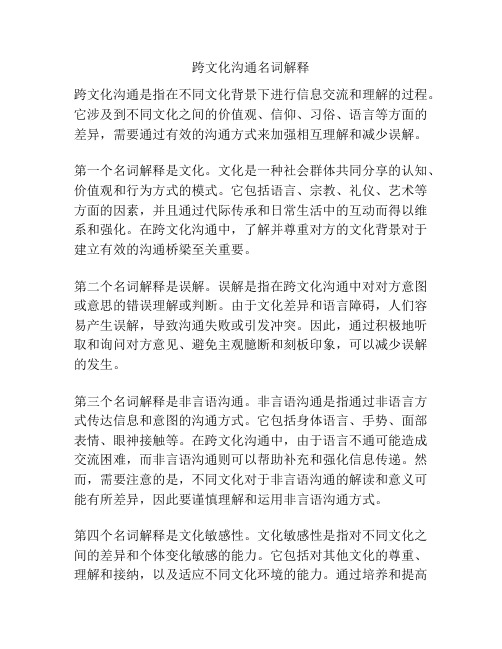
跨文化沟通名词解释跨文化沟通是指在不同文化背景下进行信息交流和理解的过程。
它涉及到不同文化之间的价值观、信仰、习俗、语言等方面的差异,需要通过有效的沟通方式来加强相互理解和减少误解。
第一个名词解释是文化。
文化是一种社会群体共同分享的认知、价值观和行为方式的模式。
它包括语言、宗教、礼仪、艺术等方面的因素,并且通过代际传承和日常生活中的互动而得以维系和强化。
在跨文化沟通中,了解并尊重对方的文化背景对于建立有效的沟通桥梁至关重要。
第二个名词解释是误解。
误解是指在跨文化沟通中对对方意图或意思的错误理解或判断。
由于文化差异和语言障碍,人们容易产生误解,导致沟通失败或引发冲突。
因此,通过积极地听取和询问对方意见、避免主观臆断和刻板印象,可以减少误解的发生。
第三个名词解释是非言语沟通。
非言语沟通是指通过非语言方式传达信息和意图的沟通方式。
它包括身体语言、手势、面部表情、眼神接触等。
在跨文化沟通中,由于语言不通可能造成交流困难,而非言语沟通则可以帮助补充和强化信息传递。
然而,需要注意的是,不同文化对于非言语沟通的解读和意义可能有所差异,因此要谨慎理解和运用非言语沟通方式。
第四个名词解释是文化敏感性。
文化敏感性是指对不同文化之间的差异和个体变化敏感的能力。
它包括对其他文化的尊重、理解和接纳,以及适应不同文化环境的能力。
通过培养和提高文化敏感性,人们可以更好地理解和应对跨文化沟通中可能出现的问题,为有效的沟通创造条件。
总结起来,跨文化沟通是一种涉及到不同文化之间的信息交流和理解的过程。
了解并尊重对方的文化背景、避免误解、理解并运用非言语沟通以及培养文化敏感性是跨文化沟通的重要方面。
什么是跨文化沟通?

什么是跨文化沟通?跨文化沟通是指在不同文化背景下进行的人际交往过程中形成的数据转移。
这种交流过程不仅涉及到语言、文字和符号的传递,还涉及到文化差异、社会习俗和价值观的交流与认同。
跨文化沟通是一项复杂而具有挑战性的任务,特别是当涉及到异国文化的时候。
因此,为了有效地交流,我们需要掌握一些跨文化沟通的技巧。
在这篇文章中,我们将介绍什么是跨文化沟通以及如何掌握这些技巧。
一、什么是跨文化沟通?1.1 定义跨文化沟通是指在不同文化背景下进行的人际交往过程中产生的数据交流过程。
这种交流过程涉及到语言、符号和价值观的传递,还包括非语言沟通的手势、面部表情和姿势等。
1.2 特征跨文化沟通有以下几个特征:(1) 多元性跨文化沟通的参与者来自不同的文化背景,他们有不同的语言和文化认知,因此他们的观点和理解也会不同。
(2) 情境性跨文化交流的情境因文化差异而变化,因此必须根据不同情况和文化差异调整自己的沟通方式。
(3) 复杂性跨文化交流不仅涉及到语言和非语言沟通,还涉及到文化习俗和价值观的异同,因此需要特别小心和注意。
二、如何进行跨文化沟通?2.1 理解跨文化差异要有效地进行跨文化沟通,首先需要理解文化差异对沟通的影响。
例如,对于东亚人来说,沉默和不说话是一种尊重和礼貌的表现,而对于西方人来说,这可能意味着不感兴趣或者厌烦。
因此,了解文化差异非常重要,可以帮助我们避免误解和冲突。
2.2 尽可能使用简单的语言和句子尽可能使用简单的语言和句子可以使跨文化交流更加顺畅。
这样的好处是显而易见的,利用更加普通的词汇和句子让理解更加容易,在满足基本意思的前提下提高交流的效率。
2.3 避免使用俚语和难懂的方言如果要进行跨文化交流,最好避免使用俚语和当地句式,因为不同的文化习惯对于语言的使用有不同的要求。
如中国的四川话对于大多数人都是难以理解的。
2.4 不要擅自推断对方的意思在跨文化交流中,我们不应该自作聪明地推断对方的意思。
如果我们不能理解或者搞清楚对方的话,应该再次问明白。
跨文化交际名词解释
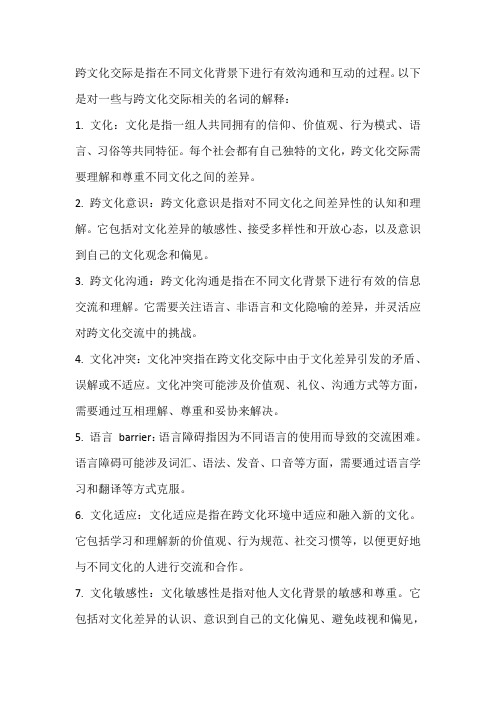
跨文化交际是指在不同文化背景下进行有效沟通和互动的过程。
以下是对一些与跨文化交际相关的名词的解释:
1. 文化:文化是指一组人共同拥有的信仰、价值观、行为模式、语言、习俗等共同特征。
每个社会都有自己独特的文化,跨文化交际需要理解和尊重不同文化之间的差异。
2. 跨文化意识:跨文化意识是指对不同文化之间差异性的认知和理解。
它包括对文化差异的敏感性、接受多样性和开放心态,以及意识到自己的文化观念和偏见。
3. 跨文化沟通:跨文化沟通是指在不同文化背景下进行有效的信息交流和理解。
它需要关注语言、非语言和文化隐喻的差异,并灵活应对跨文化交流中的挑战。
4. 文化冲突:文化冲突指在跨文化交际中由于文化差异引发的矛盾、误解或不适应。
文化冲突可能涉及价值观、礼仪、沟通方式等方面,需要通过互相理解、尊重和妥协来解决。
5. 语言barrier:语言障碍指因为不同语言的使用而导致的交流困难。
语言障碍可能涉及词汇、语法、发音、口音等方面,需要通过语言学习和翻译等方式克服。
6. 文化适应:文化适应是指在跨文化环境中适应和融入新的文化。
它包括学习和理解新的价值观、行为规范、社交习惯等,以便更好地与不同文化的人进行交流和合作。
7. 文化敏感性:文化敏感性是指对他人文化背景的敏感和尊重。
它包括对文化差异的认识、意识到自己的文化偏见、避免歧视和偏见,
并以尊重和包容的态度对待不同文化。
跨文化交际是在全球化时代中越来越重要的能力,它帮助个人和组织更好地理解和应对多元文化环境中的挑战,并促进不同文化之间的和谐与合作。
什么是跨文化交流?

什么是跨文化交流?跨文化交流是指不同文化背景下的人之间的信息沟通和交流。
它是一种相互学习和理解彼此文化的过程。
随着全球化的发展,跨文化交流变得越来越重要,因为现在人们需要与来自不同文化背景的人进行沟通和合作。
本文将详细介绍什么是跨文化交流,以及跨文化交流的重要性和注意事项。
第一部分:跨文化交流的重要性1. 开拓视野跨文化交流可以为个人和组织带来不同的视角和新的思维方式。
对于个人来说,跨文化交流可以展示不同的文化遗产,使其能够了解和欣赏其他文化的独特之处。
对于组织来说,则可以打破内部僵化结构,促进员工之间的协作和创新。
2. 增进人际关系跨文化交流还可以帮助人们建立持久的人际关系。
通过交际,不同文化背景下的人可以了解彼此,深入了解各自的文化、价值观和信仰。
同时,这种交往过程中也能促进对自身文化的认知和理解。
3. 促进商务合作随着经济全球化的不断深入,企业之间的跨国合作也越来越常见。
在这种情况下,跨文化交流显得尤为重要,因为它可以帮助企业了解对方文化中的商业价值观,从而更好地处理商务合作过程中的矛盾和问题。
第二部分:跨文化交流的注意事项1. 尊重其他文化在跨文化交流过程中,尊重其他文化非常重要。
在良好的交流中,不同文化的人必须互相尊重,不干涉对方文化、信仰和传统。
通过这种方式,可以确保交流愉快、成功并且长期。
2. 理解差异不同文化背景下的人之间存在着许多差异,包括语言、文化、观念等。
在跨文化交流中,要学会尝试理解对方的差异,并合适地应对,进而逐渐适应这些不同。
3. 学习和了解文化了解对方文化和价值观对于高效的跨文化交流是至关重要的。
学习和了解文化能够帮助我们避免不必要的地域和文化上的误解,让交流的过程更加顺畅、有效。
结论跨文化交流不仅是一个人与其他文化背景下的人之间的信息沟通和交流,还是开拓视野、增进人际关系和促进商务合作的重要切入点。
在跨文化交流中,我们需要尊重对方文化,理解对方差异,学习和了解对方文化。
跨文化交际名词解释汇总

跨文化交际名词解释汇总
跨文化交际(Intercultural Communication)是指不同文化之间进行的交际活动。
在跨文化交际中,涉及到许多名词和概念。
以下是对一些常见的跨文化交际名词的解释:
1.文化(Culture):文化是人类社会的一种现象,包括人类所共同创造的一切物质和非物质的事物,如语言、宗教、价值观念、习俗等。
2.文化冲突(Culture Clash):指不同文化之间的价值、信仰、行为方式等存在差异,导致交流过程中产生的冲突。
3.文化认知(Cultural Awareness):指人们对不同文化的理解、认识和感知。
4.跨文化交际能力(Intercultural Communication Competence):指具备有效应对跨文化交际的能力,包括对不同文化的理解、适应和应对。
5.文化智商(Cultural Intelligence):指人们在跨文化交际中应对复杂情境的能力,包括对文化差异的认知、理解和应对能力。
6.文化适应(Culture Adaptation):指在新的文化环境中,个体逐渐适应并接受该文化的过程。
7.文化刻板印象(Cultural Stereotype):指对某一文化或文化群体的普遍化、片面化的看法和评价。
8.文化代际冲突(Intergenerational Culture Conflict):指不同世代之间在文化、价值观念等方面的差异导致的冲突。
9.文化霸权(Cultural Hegemony):指某一特定文化在全球范围内的主导地位。
以上是一些常见的跨文化交际名词的解释。
在跨文化交际中,了解这些名词的含义对于有效的跨文化交际至关重要。
跨文化交流概念整理

跨文化交流概念整理概述:跨文化交流是指不同文化背景下的人们之间进行信息、知识、观念、价值观等方面的交流和互动。
在全球化的背景下,跨文化交流变得越来越重要,它有助于促进不同国家和地区之间的合作与交流,增进相互理解与尊重,推动文化多样性的发展。
1. 文化的定义与特点文化是人类社会发展过程中创造的一切物质和精神财富的总和,包括艺术、宗教、语言、习俗、价值观等。
每一个国家和地区都有自己独特的文化,反映了该地区的历史、地理、社会制度等方面的特点。
文化具有多样性、传承性、变革性和开放性等特点。
2. 跨文化交流的重要性跨文化交流有助于促进不同国家和地区之间的合作与交流,推动经济、科技、教育、艺术等领域的发展。
它能够增进相互理解与尊重,减少误解和冲突,促进和谐与稳定的国际关系。
跨文化交流还能够推动文化多样性的发展,丰富人类文明的内涵。
3. 跨文化交流的挑战与障碍跨文化交流面临着语言障碍、价值观差异、文化冲突等挑战。
语言障碍是最常见的问题,不同国家和地区使用不同的语言,交流双方需要通过学习对方的语言来进行有效的沟通。
价值观差异也是一个重要的挑战,不同文化有不同的价值观念和行为准则,需要双方进行相互理解和尊重。
文化冲突是跨文化交流中最严重的问题之一,不同文化之间存在着差异和冲突,需要通过对话和妥协来解决。
4. 跨文化交流的方法与策略跨文化交流需要双方进行积极的沟通和合作,以下是一些常用的方法和策略:- 学习对方的语言:通过学习对方的语言,可以更好地理解对方的思维方式和文化背景。
- 尊重对方的文化:尊重对方的文化是跨文化交流的基本原则,要避免偏见和歧视。
- 倾听和表达:在跨文化交流中,要注重倾听对方的观点和意见,同时也要清晰地表达自己的想法和观点。
- 学习对方的礼仪与习俗:不同文化有不同的礼仪和习俗,了解并尊重对方的礼仪与习俗是跨文化交流的重要一环。
- 参预文化活动:参预对方的文化活动可以增进对方的理解和认同,促进跨文化交流的深入发展。
跨文化交流
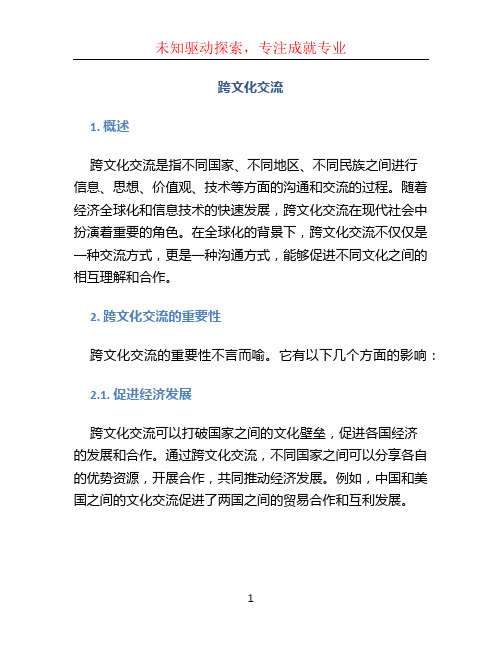
跨文化交流1. 概述跨文化交流是指不同国家、不同地区、不同民族之间进行信息、思想、价值观、技术等方面的沟通和交流的过程。
随着经济全球化和信息技术的快速发展,跨文化交流在现代社会中扮演着重要的角色。
在全球化的背景下,跨文化交流不仅仅是一种交流方式,更是一种沟通方式,能够促进不同文化之间的相互理解和合作。
2. 跨文化交流的重要性跨文化交流的重要性不言而喻。
它有以下几个方面的影响:2.1. 促进经济发展跨文化交流可以打破国家之间的文化壁垒,促进各国经济的发展和合作。
通过跨文化交流,不同国家之间可以分享各自的优势资源,开展合作,共同推动经济发展。
例如,中国和美国之间的文化交流促进了两国之间的贸易合作和互利发展。
2.2. 促进文化多样性跨文化交流可以促进文化多样性的发展。
每个国家和地区都有其独特的文化传统和价值观,通过跨文化交流,不同文化之间可以相互借鉴、交流和吸收,增加文化的多样性。
这有助于推动世界文化的繁荣和发展。
2.3. 提升个人能力跨文化交流有助于个人的成长和能力的提升。
在跨文化交流中,个人需要面对不同的文化背景和观念,学会尊重和理解他人。
这不仅仅是一种跨文化能力的培养,同时也是一种涵养个人情操和修养的方式。
3. 跨文化交流的挑战和解决方案尽管跨文化交流有许多好处,但也面临着一些挑战。
以下是一些常见的挑战和相应的解决方案:3.1. 语言障碍语言是跨文化交流中最常见的障碍之一。
不同国家和地区使用不同的语言,这给交流带来了困难。
解决这个问题的方式是学习对方的语言,或者通过使用通用的国际语言如英语进行交流。
3.2. 文化差异不同文化之间存在着差异,包括价值观、礼仪和社交规则等。
这些差异可能会导致误解和冲突。
为了解决这个问题,交流双方需要进行互相理解和尊重,积极学习对方的文化,以避免误解和冲突的发生。
3.3. 传统观念的束缚传统观念和习俗可能会成为跨文化交流的障碍。
某些传统观念可能会对对方产生压力,影响交流的效果。
跨文化沟通基础知识
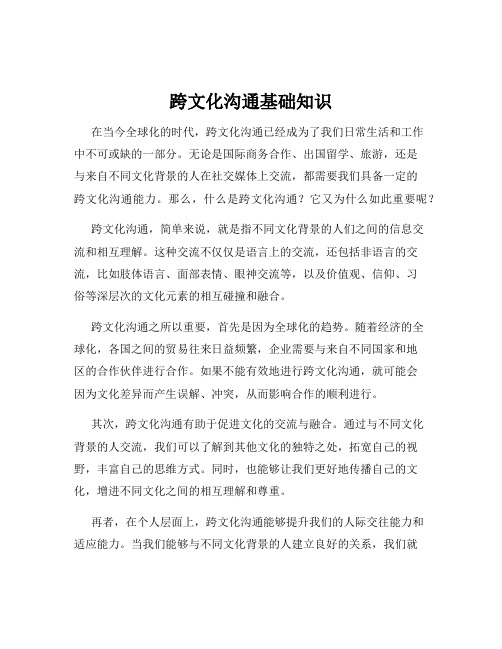
跨文化沟通基础知识在当今全球化的时代,跨文化沟通已经成为了我们日常生活和工作中不可或缺的一部分。
无论是国际商务合作、出国留学、旅游,还是与来自不同文化背景的人在社交媒体上交流,都需要我们具备一定的跨文化沟通能力。
那么,什么是跨文化沟通?它又为什么如此重要呢?跨文化沟通,简单来说,就是指不同文化背景的人们之间的信息交流和相互理解。
这种交流不仅仅是语言上的交流,还包括非语言的交流,比如肢体语言、面部表情、眼神交流等,以及价值观、信仰、习俗等深层次的文化元素的相互碰撞和融合。
跨文化沟通之所以重要,首先是因为全球化的趋势。
随着经济的全球化,各国之间的贸易往来日益频繁,企业需要与来自不同国家和地区的合作伙伴进行合作。
如果不能有效地进行跨文化沟通,就可能会因为文化差异而产生误解、冲突,从而影响合作的顺利进行。
其次,跨文化沟通有助于促进文化的交流与融合。
通过与不同文化背景的人交流,我们可以了解到其他文化的独特之处,拓宽自己的视野,丰富自己的思维方式。
同时,也能够让我们更好地传播自己的文化,增进不同文化之间的相互理解和尊重。
再者,在个人层面上,跨文化沟通能够提升我们的人际交往能力和适应能力。
当我们能够与不同文化背景的人建立良好的关系,我们就能够更好地适应多元化的社会环境,拓展自己的社交圈子,获得更多的发展机会。
然而,跨文化沟通并非一帆风顺,其中存在着诸多障碍和挑战。
语言障碍是最显而易见的。
不同的语言有着不同的语法、词汇和表达方式,如果我们不能熟练掌握对方的语言,就很容易在沟通中出现误解。
比如,一些词语在一种语言中可能有特定的含义,但在另一种语言中可能完全不同,甚至不存在。
文化差异也是一个重要的障碍。
不同的文化有着不同的价值观、信仰、习俗和社会规范。
例如,在某些文化中,直接表达自己的意见被视为坦诚和直率;而在另一些文化中,可能会被认为是不礼貌和冒犯。
同样,对于时间的观念、个人空间的需求、礼仪等方面,不同文化也存在着很大的差异。
跨文化交际学基础知识

跨文化交际学基础知识在当今全球化的时代,跨文化交际变得日益频繁和重要。
无论是在商务合作、旅游出行、学术交流还是日常社交中,我们都可能会与来自不同文化背景的人打交道。
了解跨文化交际学的基础知识,能够帮助我们更好地理解和应对这些交流情境,避免误解和冲突,促进有效的沟通和合作。
一、跨文化交际的定义和范畴跨文化交际,简单来说,就是指不同文化背景的人们之间的交流。
这不仅包括语言的交流,还涵盖了非语言的沟通方式,如肢体语言、面部表情、眼神交流等;同时也涉及到价值观、信仰、习俗、社会规范等深层次的文化元素。
跨文化交际的范畴非常广泛。
从国际商务谈判到跨国旅游,从留学生在异国的学习生活到跨国公司的团队合作,从国际婚姻到互联网上的全球社交,无一不是跨文化交际的具体体现。
二、文化的概念与特征要理解跨文化交际,首先需要明白什么是文化。
文化是一个复杂而多维度的概念,可以被看作是一个群体或社会所共同拥有的知识、信仰、艺术、道德、法律、习俗以及其他各种能力和习惯的总和。
文化具有以下几个显著特征:1、习得性:我们不是生来就具备某种文化的特质,而是通过后天的学习和社会化过程逐渐获得的。
2、传承性:文化通过代际传承得以延续,长辈将文化传递给晚辈。
3、象征性:文化中的许多元素,如语言、符号、仪式等,都具有象征意义,代表着特定的价值观和观念。
4、动态性:文化并非一成不变,它会随着时间的推移和社会的发展而不断演变和变化。
三、文化差异在跨文化交际中的体现文化差异在跨文化交际中体现在多个方面。
语言方面,不同的语言有着不同的语法、词汇和表达方式。
例如,在一些语言中,敬语的使用非常严格和复杂,而在另一些语言中则相对简单。
价值观方面,不同文化对于个人主义与集体主义、权力距离、不确定性规避等有着不同的看法。
在个人主义文化中,强调个人的成就和独立;而在集体主义文化中,更注重集体的利益和团结。
社交礼仪方面,打招呼的方式、送礼的习俗、用餐的礼仪等都可能因文化而异。
- 1、下载文档前请自行甄别文档内容的完整性,平台不提供额外的编辑、内容补充、找答案等附加服务。
- 2、"仅部分预览"的文档,不可在线预览部分如存在完整性等问题,可反馈申请退款(可完整预览的文档不适用该条件!)。
- 3、如文档侵犯您的权益,请联系客服反馈,我们会尽快为您处理(人工客服工作时间:9:00-18:30)。
CatalogueChapter 1 (2)Chapter 2 (5)Chapter 3 (6)Chapter 4 (8)Chapter 5 (9)Chapter 6 (11)Chapter 7 (12)Chapter 8 (15)Chapter 9 (16)Chapter 11.Culture :➢Anthropological(人类学):It consists of patterns, explicit(含蓄的)and implicit(明晰的), of and for behavior acquired and transmitted(传承的)by symbols, constituting(组成)the distinctive achievement of human groups, including their embodiments in artifacts(工艺品); the essential core(核心)of culture consists of traditional ideas and especially their attached(关联的)values.”➢Psychological(心理学):Culture is the collective programming of the mind whichdistinguishes the members of one category of people from another.➢Sociological(社会学):Culture is defined as a pattern of learned, group-related perception —including both verbal and nonverbal language attitudes, values, belief system, disbeliefsystems, and behavior.Culture pervades(遍及) all these areas:arts and artifacts, beliefs, behaviors, ceremonies, concept of self, customs, ideas and thought patterns, ideals, knowledge, laws, language,manners, morals, myths and legends, religion, rituals(仪式), social institutions(社会机构), tools, and values. Culture is the total sum of human society and its meanings.➢Intercultural(知性):Culture is a system of shared beliefs, values, customs, behaviors and artifacts that are transmitted from generation to generation through learning.➢Summary:We define culture as “the deposit of knowledge, experience, beliefs, values, actions, attitudes, hierarchies, religions, notions of time, roles, spatial relations, concepts of the universe, and artifacts acquired by a group of people in the course of generations throughindividual and group striving.2.Visible Culture: According to The Concise Oxford Dictionary, culture is “the arts and other manifestations of human intellectual achievement regarded collectively”.3.Invisible Culture:4.The nature of Culture(文化属性):a)C ulture is like an iceberg.(参见9,10)b)C ulture is our software.c)C ulture is like the water a fish swims in:The fish takes the water for granted because itis totally surrounded by the water that it really cannot imagine another environment. Thesame is true for us. Our culture is so much a part of who we are and what the world is like for us that we do not notice it. We take it for granted.d)C ulture is the grammar of our behavior: In order to behave appropriately(合适地) in anysociety, people need to know the culture. It includes all the rules that make actionsmeaningful to the people around them.5.Characteristic of Culture :a)C ulture is learned(习得的):We learn our culture: ①through proverbs(谚语)②from folklore(民间故事)③through art④mass media(大众传媒).b)C ulture is dynamic(动态的):Four major aspects account for the change of cultures: ①technological invention②disaster: include natural and human calamities(灾难)③culturecontact(文化接触)④environment factors(环境因素).c)C ulture is pervasive(普遍的):Like the air we breathe, culture penetrates(渗透) into everyaspect of our life and influences the way we think, the way we talk, and the way we behave.d)C ulture is integrated(综合的):Culture functions as(起到作用) an integrated whole and it issystemic. You touch a culture in one place and everything else is affected.e)C ulture is adaptive(具有适应性的):History abounds(富于) with examples of how cultureshave changed because of laws, natural disasters, wars, or other calamities.6.Cultural Identity(文化身份):Cultural identity refers to one’s sense of belonging to a particular culture or ethnic(种族的;民族的) group.7.Formation of Cultural Identitya)Unexamined Cultural Identity (文化身份不确定阶段):take for granted;little interest;lack anawareness of.b)Cultural Identity Search(找寻文化身份阶段):c)Cultural Identity Achievement(习得文化身份阶段):8.Subculture(亚文化):➢It refers to a culture that exists within dominant culture(主流文化), and is often based on economic or social class, ethnicity, race, or geographic region.➢Subcultures refer to different social communities that share race, or ethnic background, or profession, or gender, or age, or sexual preference.➢A subculture resembles(类似,像) a culture in that it usually encompasses(包含) a relatively large number of people and represents(代表) the accumulation(积累) of generations ofhuman striving. However, subcultures have some important differences: they exist withindominant cultures(主流文化) and are often based on economic or social class, ethnicity, race, or geographic region.9.Co-culture(共文化): No one culture is superior to other co-exiting cultures. It refers to groups or social communities exhibiting communication characteristics, perceptions, values, beliefs, and practices that are significantly different enough to distinguish them from the other groups, communities, and the dominant culture.10.Subgroup(亚群体):It does not involve the same large number of people and is not necessarily thought of as accumulating values and patterns of behavior over generations in the same way as cultures do. Subgroups can be as small as a few people or as large as a major religion.11.Characteristics of Subgroups:a)“Deviant” label: It simply means differing from the cultural norm, such as vegetarians in ameat-eating society.b)T emporality: Members may participate for a time and later become inactive or separate from italtogether.c)“Wanna-be” behavior:An individual who imitates the behavior of a group he or she desires tobelong to.Chapter 2ponents of Communication(交际要素):a)Sender/Source (信息源): It is the person who transmits a message.b)Message: It is any signal that triggers(引发,引起) the response of a receiver.c)Encoding(编码): Encoding refers to the activity during which the sender must choosecertain words or nonverbal methods to send an intentional(故意的,计划的) message.d)Channel /Medium: It is the method used to deliver a message.e)Receiver: It is any person who notices and gives some meaning to a message.f)Decoding(解码): It is the activity during which the receiver attaches meaning to thewords or symbols he/she has received.g)Feedback (反馈): The response of a receiver to a sender’s message.h)Noise:is anything that distorts(interfere干扰)the message, including externalnoise(外界干扰),physiological noise(生理干扰) ,psychological noise(心理干扰) andsemantic noise(语义干扰). Noise is inevitable(必然的,不可避免的).i)Context(语境): The setting or situation within which communication takes place.2.Intercultural communication(跨文化交际): It is the communication between people ofdifferent cultural backgrounds whose cultural perceptions and symbol systems are distinctenough to alter the communication events.3.Intracultural communication(文化内交际): It is defined as communication between oramong members of the same culture.4.Interpersonal communication(人际交流): It is form of communication that involves a smallnumber of individuals who are interacting(交流) exclusively(专有地)with one another andwho therefore have the ability to adapt their messages specifically for those others and to obtain immediate interpretations(解释) from them .5.International communication(国际交流): it takes place between nations and governmentsrather than individuals; it is quite formal and ritualized(仪式化的).6.Interracial communication(跨种族交际): It occurs when the sender and the receiverexchanging messages are from different races.7.Interethnic communication(跨民族交际): It refers to communication between people of thesame race but different ethnic backgrounds.8.Interregional communication(跨地域交际): This term refers to the exchange of messagesbetween members of the dominant culture within a country.These are members of a culture who share common messages and experiences over a long period of time. However, they live in different regions of the same country.Chapter 31.Sensation(感觉):It is the neurological(神经学上的) process by which people become aware oftheir environment.2.Perceiving:a)Perception(知觉):I t is the process by which we become aware of objects, events, andespecially people and their behavior through our various senses and involves higher-order cognition(认知) in the interpretation(解释) of the sensory information.(知觉是一种人们通过各种感觉来觉察事物、事件、人和人的行为的过程。
